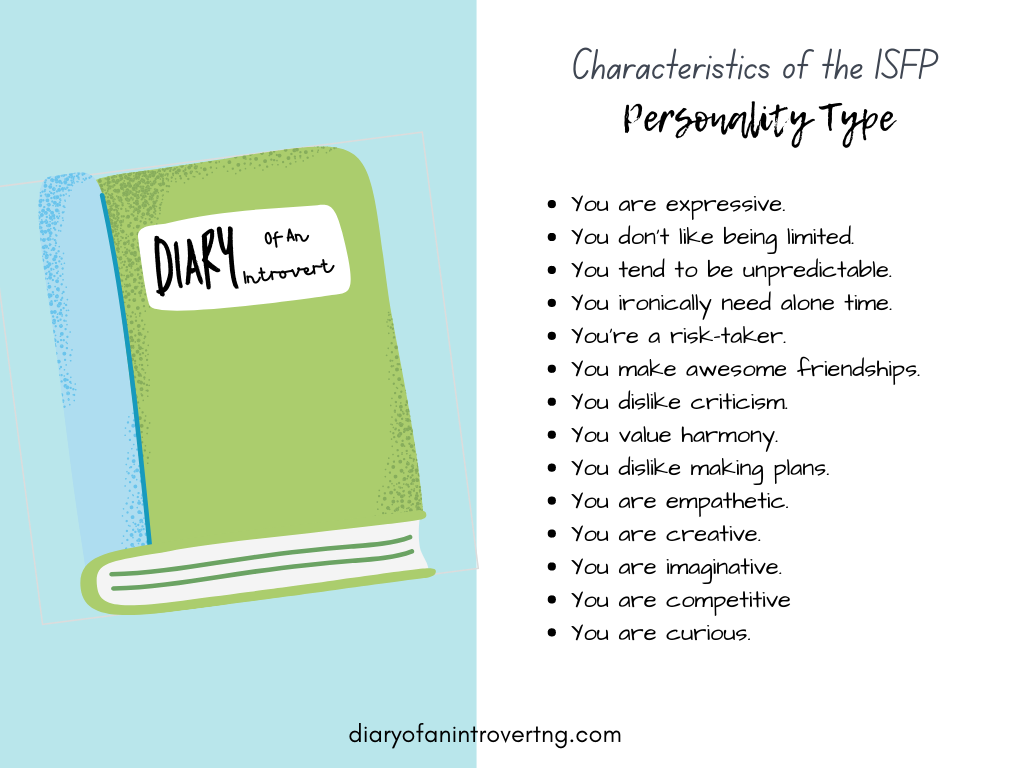Artistic & Charming: See 20 Signs of the ISFP Personality Type
Photo by Ethan Rougon on Unsplash
According to the Myers-Briggs personality test, the ISFP meaning is an introverted, observant, feeling, prospecting personality type. See a detailed look at the ISFP cognitive functions of the ISFP personality to know how their brains operate.
The I in ISFP stands for the introverted mind and refers to someone who prefers minimally stimulating environments and has a reserved personality.
The S in ISFP stands for one’s observable qualities. People with this trait focus on facts in real-time and straightforward outcomes more than imaginable concepts.
The F in ISFP stands for someone who leans more to their feelings. They make decisions with their heart and rely less on logic.
The P in ISTP stands for a person’s prospecting tactics. People with this character trait are spontaneous and tend to make impulsive decisions.
The personality ISFP is called the Adventurer. It might occasionally be called the ISFP Composer or the Artist personality type. The ISFP personality type is the fourth most common personality type, making up nine percent of the worldwide population.
There are two types of ISFPs, which are the ISFP -A & ISFP-T. The Assertive Adventurer (ISFP-A) is notably more confident and self-assured than the Turbulent Adventurer (ISFP-T), who tend to conduct self-analysis more often.
Related: 3 Powerful Things Your Introverted MBTI Turbulent Type Knows
Here are twenty ISFP functions a person might exhibit if they pass the ISFP personality test.
20 Traits Of The ISFP Personality Type
Photo by Samuel Branch on Unsplash
You are expressive.
One of the key traits of the ISFP personality type is their expressiveness. An Adventurer enjoys using their decisions or actions to reveal an unconventional way of life that many aren’t aware of. Their auxiliary cognitive function is Extroverted Sensing (Si), which means they crave to experience the world physically, and with all their five senses.
This gives them a unique, hands-on interpretation of life that they often translate to their art and lifestyles. It also helps them connect intimately with whoever might be watching.
2. You don’t like being limited.
If you have the Adventurer personality, you might dislike formality in social settings or being in limiting environments. You might even choose to break certain rules to gain social freedom. ISFPs enjoy having the liberty to be themselves, without worrying about upsetting others.
Therefore, people with the ISFP personality might enjoy intense activities like extreme sports or traveling to different places because it allows them to fully express themselves. They don’t feel like they're boxed into a social setting where they have to comply with certain rules.
3. You tend to be unpredictable.
Due to how much the personality type Adventurer seeks to express themselves, these individuals tend to be spontaneous. They might enjoy one activity one moment and be eager to do another one the next moment.
Such actions can seem too unpredictable to people around them, making them wonder what they’ll do next. If you’ve ever experienced this, then you might have the Adventurer personality type.
4. You ironically need alone time.
Despite how outgoing the Adventurer personality is, people with its traits are ironically still introverts. This factor can come off as a surprise to many, especially when they choose to be reserved.
Since the ISFP Myers Briggs type use all their senses and even their emotions in their activities, they tend to burn out faster and need a mental recharge. ISFPs use their downtime for quality introspection, where they analyze their inner working, alongside gaining mental energy.
5. You’re a risk-taker.
Another quality trait of the Myers Briggs ISFP type is that they are extremely passionate. Their drive towards some of their goals makes them profound risk-takers. People with the ISFP MBTI traits tend to live in the moment, using all their senses to function optimally.
This process gives them an advantage with certain risky tasks because they are actively present, without thinking about the possible dangers or repercussions. It also helps them to achieve their dreams faster than other personality types.
6. You make awesome friendships.
There’s an undoubtable charm about the 16 personalities Adventurer that shows when they relate with people. These individuals have numerous experiences they’d love to share with others, and often enjoy relating with people.
Due to their Introverted Feeling (Fi) dominant function, they often have a strong sense of self that builds their charisma during conversations. All these attributes help the Adventurer Myers Briggs type make beautiful relationships with others.
Related: Am I Too Quiet? P.S. No, You’re Not. A How-To Guide to Using Your Introversion to Your Advantage
7. You dislike criticism.
Since the MBTI Adventurer is warm and charming, knowing what to say to brighten someone’s day, they often dislike criticism. In most cases, they might try to block off negative comments with their charisma in return. However, if the critique gets through, ISFPs tend to respond with sudden outbursts.
If certain statements tend to offend you, especially about your passionate habits, it’s one of the signs you might have the ISFP 16 personalities traits.
8. You value harmony.
Despite the reaction of the Myers Briggs Adventurer to criticism, these individuals still value having peace with others. ISFPs are also sensitive to other people’s emotions, which can make them easily forget about their altercations with others.
The MBTI ISFP person lives in the moment and responds to things based on their present emotions. Once they get out of the heat of an argument, they can easily move on like nothing ever happened. Therefore, they tend not to hold grudges.
9. You dislike making plans.
While there might be several advantages to the Adventurer 16 personalities living in the moment, it also comes with its downsides. People with ISFP characters tend to dislike making plans for the future.
They might organize certain actions that contribute to their present lifestyles or sense of identity. However, long-term goals like retirement often bore people with this personality type. If you often think of the next big adventure to embark on and not necessarily where you’ll be in sixty years, you might be an ISFP person.
10. You are empathetic.
ISFP people use their Introverted Feeling (Fi) function to internalize how things will affect people. This process might seem paradoxical, especially since this is a trait common with the Extroverted Feeling (Fe) types.
Nevertheless, people with this adventurous personality type often have a profound sense of individuality that helps them mirror other people’s emotions. They are constantly thinking about how things would feel if they were in other people’s shows, which makes them highly empathetic.
11. You are creative.
Scientists call ISFPs the MBTI Artist for a reason. Due to their profound ability to express themselves, ISFPs are deemed incredibly creative. More so, these individuals tend to find themselves straying from conventional practices, which helps them to stand out.
If creating inventive concepts comes easy to you, you might be an Adventurer. You can identify how unique this trait is if you seem to think differently from others.
12. You are imaginative.
The exploratory mindset of Adventurers makes them bold dreamers. They use their ingenuity to create insightful ideas, and this results in multiple inventions. These individuals also have an active imagination, despite craving to experience the world with all their senses.
People with the Artist personality often communicate profoundly to their audience because they always seem to have a clear picture of what they want to express.
13. You are imaginative.
The exploratory mindset of Adventurers makes them bold dreamers. They employ this ingenuity to create insightful ideas, and this results in creative inventions. These individuals often have an active imagination, despite craving to experience the world with all their senses.
Having a clear picture of what they want to express, people with the Artist personality often communicate profoundly to their audience.
14. You are competitive.
ISFPs are often too concerned about present situations that it can make them competitive. They often want to express themselves maximally, making them seek instant gratification.
Although this trait can help ISFPs achieve their goals, it tends to make them unhappy when they lose. If you have an extreme desire to always win tasks, you match this ISFP description.
15. You are curious.
People with the Artist personality have curious minds which result in constantly changing their motivations. The only downside is that ISFP people often forget to achieve an important goal before drifting to a new one.
People with adventurer personality traits often find it difficult to maintain a habit, which can be detrimental to their overall progress. However, learning to take each new venture one step at a time can indeed be productive for this personality type.
16. You tend to get stressed easily.
The emotion and exhilaration that ISFP people tend to exert during their activities can tire them out quicker than they imagined. Being an Extroverted Sensor (Se), people with the ISFP personality unconsciously give more than they take.
Therefore, these individuals need to prioritize taking necessary breaks to fully recuperate. This process will prevent them from breaking down too soon.
Liking this article? Join our Introvert Club→
17. You sometimes doubt yourself.
People with the Artist personality often can’t outline their skills in plain words. They are filled with so much creativeness that it’s difficult to identify their expertise with conventional titles. However, this can make others doubt their efficacy, thereby, causing their self-esteem to reduce.
When people criticize their passions, they might struggle to express their invaluable selves more freely. Nonetheless, ISFPs need to remember to overcome these odds despite the negative comments they might receive.
18. You dislike abstract concepts.
ISFPs tend to struggle with tasks they can’t physically experiment with. Therefore, sitting down in a classroom and listening to the sciences behind life might be an absolute bore for the ISFP personality.
The career for ISFP people is often based on their exploratory interests. If they feel confined, they most likely won’t function at maximum capacity.
19. You are flexible.
People with the ISFP personality type might be reserved, but they enjoy having new experiences. This trait makes them incredibly down-to-earth and practical, which might seem contrary to their Introverted Feeling (Fi) functions.
People with ISFP characters prioritize their flexibility and often don’t enjoy being in constricting environments. Therefore, great careers for ISFP people can include becoming a photographer, chef, stylist, and many other adaptable choices.
20. You are artistic.
The major reason why ISFPs are called Artists is because of their ability to push through regular levels of formal expressions. These individuals don’t necessarily need to be artists, even though this profession tops the list of ISFP careers. It’s more about their creative minds unusually communicating something profound to an audience.
Therefore, it’s easy to see that ISFPs are unique in their ways, expressing a certain side of life that some people desperately need to see.
Related: 5 Easy Hidden Things Each Introverted MBTI Needs in Relationships
FAQs
What does ISFP stand for?
According to the 16personalities test, the ISFP meaning is an introverted, observant, feeling, prospecting personality type. People with this personality type have Introverted Feeling (Fi) as their dominant function and Extroverted Sensing (Se) as their auxiliary function.
Is ISFP a rare personality type?
According to research, ISFP is the fourth most common personality type, amounting to nine percent of the worldwide population. Due to how common this personality type is, they often don’t struggle to connect with people of like minds or build friendly associations.
What are ISFP good at?
ISFPs are good at expressing themselves not just words, but through actions. These individuals are naturally creative and tend to flourish in environments that prioritize freedom of expression. ISFP people are also good at creating experiences and moments that are hard to forget.
Are ISFPs selfish?
An ISFP’s dominant cognitive function is Introverted Feeling (Fi), which means they focus primarily on their feelings. This trait can make them the most selfless people, who mirror other people’s emotions and wonder how they’d feel in their shoes. Otherwise, it can make them excessively self-centered where they prioritize mostly on their feelings.
What do ISFPs like to talk about?
ISFPs are passionate individuals who enjoy talking about subjects that matter to them. Their current goals and vision also make interesting conversations for ISFP people because it allows them to maintain their imaginative qualities.
Live Your Best Quiet Life
Get the Am I Too Quiet? book →
CONCLUSION
Did you enjoy this article? While ISFPs may seem unpredictable, they can learn to prioritize their creative strengths to achieve much more than they expected. Kindly leave a comment below if you liked this article, or share it with others.















